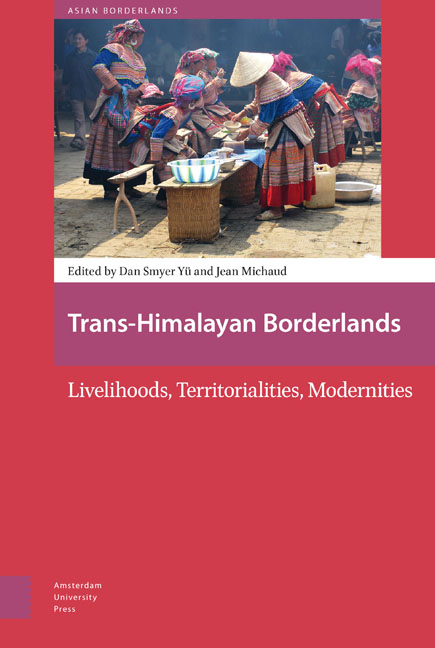Book contents
- Frontmatter
- Contents
- Acknowledgements
- Introduction: Trans-Himalayas as Multistate Margins
- I Territory, Worldviews, and Power Through Time
- 1 Adjusting Livelihood Structure in the Southeast Asian Massif
- 2 The Properties of Territory in Nepal’s State of Transformation
- 3 Trans-Himalayan Buddhist Secularities: Sino-Indian Geopolitics of Territoriality in Indo-Tibetan Interface
- 4 Buddhist Books on Trans-Himalayan Pathways: Materials and Technologies Connecting People and Ecological Environments in a Transnational Landscape
- 5 Seeking China's Back Door: On English Handkerchiefs and Global Local Markets in the Early Nineteenth Century
- II Livelihood Reconstructions, Flows, and Trans-Himalayan Modernities
- 6 Contested Modernities: Place, Subjectivity, and Himalayan Dam Infrastructures
- 7 Plurality and Plasticity of Everyday Humanitarianism in the Karen Conflict
- 8 Being Modern: Livelihood Reconstruction among Land-lost Peasants in Chenggong (Kunming)
- 9 Tibetan Wine Production, Taste of Place, and Regional Niche Identities in Shangri-La, China
- 10 Tea and Merit: Landscape Making in the Ritual Lives of the De’ang People in Western Yunnan
- 11 In-between Poppy and Rubber Fields: Experimenting a Transborder Livelihood among the Akha in the Northwestern Frontier of Laos
- 12 A Fortuitous Frontier Opportunity: Cardamom Livelihoods in the Sino-Vietnamese Borderlands
- Conclusion: Frictions in Trans-Himalayan Studies
- Index
11 - In-between Poppy and Rubber Fields: Experimenting a Transborder Livelihood among the Akha in the Northwestern Frontier of Laos
Published online by Cambridge University Press: 12 December 2020
- Frontmatter
- Contents
- Acknowledgements
- Introduction: Trans-Himalayas as Multistate Margins
- I Territory, Worldviews, and Power Through Time
- 1 Adjusting Livelihood Structure in the Southeast Asian Massif
- 2 The Properties of Territory in Nepal’s State of Transformation
- 3 Trans-Himalayan Buddhist Secularities: Sino-Indian Geopolitics of Territoriality in Indo-Tibetan Interface
- 4 Buddhist Books on Trans-Himalayan Pathways: Materials and Technologies Connecting People and Ecological Environments in a Transnational Landscape
- 5 Seeking China's Back Door: On English Handkerchiefs and Global Local Markets in the Early Nineteenth Century
- II Livelihood Reconstructions, Flows, and Trans-Himalayan Modernities
- 6 Contested Modernities: Place, Subjectivity, and Himalayan Dam Infrastructures
- 7 Plurality and Plasticity of Everyday Humanitarianism in the Karen Conflict
- 8 Being Modern: Livelihood Reconstruction among Land-lost Peasants in Chenggong (Kunming)
- 9 Tibetan Wine Production, Taste of Place, and Regional Niche Identities in Shangri-La, China
- 10 Tea and Merit: Landscape Making in the Ritual Lives of the De’ang People in Western Yunnan
- 11 In-between Poppy and Rubber Fields: Experimenting a Transborder Livelihood among the Akha in the Northwestern Frontier of Laos
- 12 A Fortuitous Frontier Opportunity: Cardamom Livelihoods in the Sino-Vietnamese Borderlands
- Conclusion: Frictions in Trans-Himalayan Studies
- Index
Summary
Abstract
Fueled by the synergy of cross-border trade, investment, and development between China and Laos, the Lao state attempts to reassert its domination over the upland areas and population by converting poppy fields into rubber land. However, at the same time, the influx and circulation of money, goods, and people resulting from the cross-border economic exchanges rework local social and economic life and produce new forms of sociality. Accordingly, my focus is on the social significance of the interactions between the Chinese and the Lao Akha in Muang Sing and Muang Long. Problemtizing the concept of ‘frontier,’ I argue that this frontier space is of multiple engagements and significantly provides the Lao Akha new ways to experiment with a spectrum of social and economic opportunities. By highlighting the role of aspiration, indigenizing modernity and personalized connections, this examination casts new lights on the Lao Akha’s experience of their livelihood transition from a subsistence-oriented to a market-based one.
Keywords: frontier, Laos, transborder livelihood experiment, indigenized modernity
Introduction
Since appearing in the 2000s, rubber plantations have spread widely throughout the areas of Laos and Myanmar which border Southwest China. This surge in rubber-cultivation activities has been primarily motivated by China's high demand for natural rubber; mainly in support of its expanding automobile industry (FAO CTTP 2010; Huang 2007). According to official Chinese discourse, the opening of rubber plantations in Laos and Myanmar close to the Chinese border provides an alternative to the growing of opium poppies in these areas, and in practice such plantations are operated by highly business-oriented state and private enterprises. By 2010, over 180 Chinese companies were engaged in agriculture projects (including rubber, sugarcane, rice, and other seasonal cash crops) in the former poppy-growing regions of Myanmar and Laos, covering 0.12 million hectares in Myanmar and 0.09 million hectares in Laos (CPGMSECP 2011).
On the Laos side, the introduction of alternative forms of development by China has been underpinned by the Laotian state's drive to modernize highland populations, halt swidden agriculture, commercialize land resources, and, through the eradication of opium production, reshape the nation's identity (Cohen 2013). Partly motivated by the high price of latex in the global market, in the mid-2000s many smallholders from ethnic groups living in the highlands of Luang Namtha – a northern Lao province – attempted to diversify their livelihoods through the cultivation of rubber.
- Type
- Chapter
- Information
- Trans-Himalayan BorderlandsLivelihoods, Territorialities, Modernities, pp. 243 - 262Publisher: Amsterdam University PressPrint publication year: 2017



